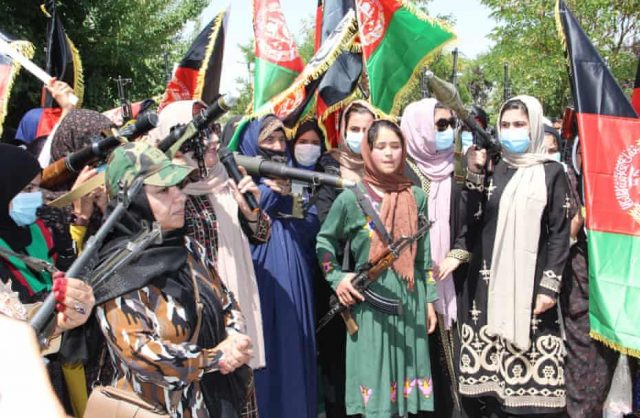independent.ie– Taliban militants shot dead at least three people yesterday, after protesters in three cities pulled down the group’s banner and raised the Afghan national flag in its place.
Witnesses said more than a dozen people were also wounded in the eastern city of Jalalabad yesterday after gunmen dispersed a protest.
The deaths appeared to signal a hard line on dissent that marred the militants’ promise not to exact reprisals, and cast further doubts on the Islamists’ offer of a general amnesty.
The killings came as the head of the British Army urged “patience” before deciding if the movement could be trusted. General Sir Nick Carter, chief of Britain’s defence staff, said: “I do think they have changed, and recognise Afghanistan has evolved and the fundamental role women have played in that evolution.”
In Jalalabad, one man who called himself Wahid said the incident began when protesters replaced the Taliban’s flag with the Afghan tricolour near the city’s Pashtunistan Square. He said: “Living is not possible any more. These youngsters here… I understand they hate the Taliban – but changing the flag has caused trouble for all of us in Jalalabad. One of our dear men was killed.”
Footage showed one young man carrying the national flag, yelling: “They can shoot me, I will die for this flag.”
Protesters also gathered in the eastern cities of Khost and Asadabad to take down the Taliban’s white flag, which is emblazoned with Islamic scripture in black. They replaced it with the black, red and green banner of the Afghan Republic – which features the same verse but less prominently.
A group of women had already taken to the streets of Kabul on Tuesday, demanding the Taliban respect their rights.
But Shabnam Dawran, a presenter for Afghan TV station RTA Pashto, yesterday said she was prevented by militants from entering her office.
Taliban spokesmen have gone to great lengths to reassure Afghans and foreign governments that they will not return to the brutal methods they employed in the 1990s, when public floggings and beheadings were common.
Mullah Baradar, the group’s co-founder, arrived in Kandahar on Tuesday, but has yet to make any public declarations. Other leaders are returning from exile.
One Taliban official has suggested the country may be run by a ruling council, while Haibatullah Akhundzada, the movement’s supreme leader, remains in overall charge. Waheedullah Hashimi said: “There will be no democratic system at all, because it does not have any base in our country.”
Asked about female education, he said: “Our scholars will decide whether girls are allowed to go to school or not.”
In Kabul, life yesterday appeared to be returning to some semblance of normality, with ice-cream vans playing music and more shops slowly opening.
Taliban fighters were still highly visible on the streets and there were continued reports of search parties looking for government officials and journalists.
But chaos continued at the city’s international airport, where Western governments are trying to evacuate their citizens and those Afghans who worked with foreign troops and diplomats.
Thousands of people crowded onto gridlocked roads while some attempted to tunnel under or climb over the fence. Many said they had arrived without visas or tickets in the belief, or hope, that British or American troops would help them leave the country.
At the airport’s east gate one woman was heard screaming “the Taliban are coming for me” as she begged soldiers to let her in.
Meanwhile the EU is “intensifying” its work with Turkey, in an attempt to prevent a flood of Afghan refugees from reaching European shores.
However, officials in Turkey – which is already home to more refugees than anywhere else in the world – warned Brussels that it is not prepared to act as “the border guard or refugee camp of the EU”.
EU High Representative for Foreign Affairs Josep Borrell yesterday said Turkey would play a “key role” in managing a potential influx of thousands of Afghans.
“They will be coming to Europe via Iran, Iraq or the eastern Mediterranean,” Mr Borell said. “We need to work hard with transit countries. A humanitarian crisis must be prevented. Here, Turkey will play a very important role.”
EU leaders want to avoid a repeat of the 2015 refugee crisis, when more than 1.2 million people claimed asylum in the bloc. France and Germany have already called for those fleeing the Taliban to be given shelter in countries on the route to Europe.
The EU is “intensifying our work with host communities in Pakistan, Iran, Tajikistan, as well as other countries such as Turkey,” added Ylva Johansson, EU Commissioner for Home Affairs. (©Telegraph Media Group Ltd, 2021)







